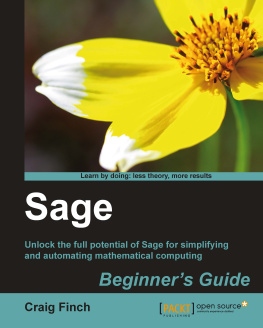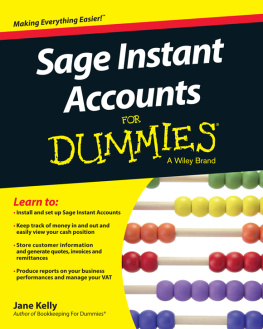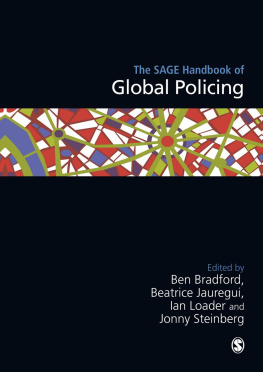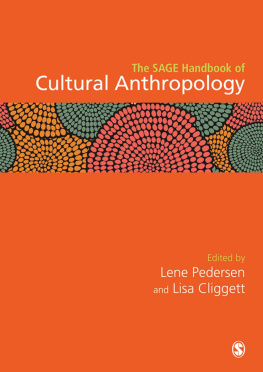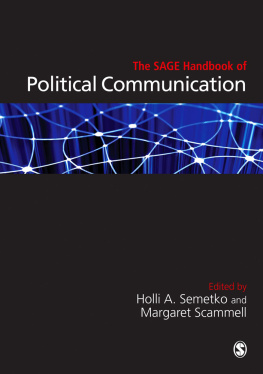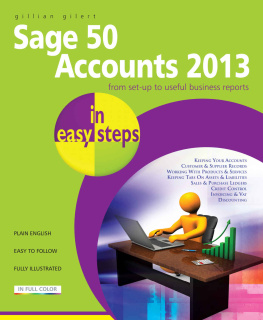Dr. David Kirkby
About the Author
Craig Finch is a Ph. D. Candidate in the Modeling and Simulation program at the University of Central Florida (UCF). He earned a Bachelor of Science degree from the University of Illinois at Urbana-Champaign and a Master of Science degree from UCF, both in electrical engineering. Craig worked as a design engineer for TriQuint Semiconductor, and currently works as a research assistant in the Hybrid Systems Lab at the UCF NanoScience Technology Center. Craig's professional goal is to develop tools for computational science and engineering and use them to solve difficult problems. In particular, he is interested in developing tools to help biologists study living systems. Craig is committed to using, developing, and promoting open-source software. He provides documentation and "how-to" examples on his blog at http://www.shocksolution.com.
I would like to thank my advisers, Dr. J. Hickman and Dr. Tom Clarke, for giving me the opportunity to pursue my doctorate. I would also like to thank my parents for buying the Apple IIGS computer that started it all.
About the Reviewers
Dr. David Kirkby is a chartered engineer living in Essex, England. David has a B.Sc. in Electrical and Electronic Engineering, an M.Sc. in Microwaves and OptoElectronics, and a Ph.D. in Medical Physics. Despite David's Ph.D. being in Medical Physics, it was primarily an engineering project, measuring the optical properties of human tissue, with a mixture of Monte Carlo modeling, radio frequency design, and laser optics. David was awarded his Ph.D. in 1999 from University College London.
Although not a mathematician, Dr. Kirkby has made extensive use of mathematical software. Most of his experience has been with MathematicaTM from Wolfram Research, although he has used both MATLABTM and SimulinkTM too.
David is the author of a number of open-source projects, including software for modeling transmission lines using finite difference (http://atlc.sourceforge.net/), design of Yagi-Uda antennas (http://www.g8wrb.org/yagi/) which can use a genetic algorithm for optimization, as well as software for data collection and analysis from electronic test equipment. David once wrote a web-based interface to MathematicaTM (http://witm.sourceforge.net/) which allows MathematicaTM to be used from a personal computer, PDA or smartphone.
Soon after the Sage project was started by Professor William Stein, Dr. Kirkby joined the development of Sage. He primarily worked on the successful port of Sage to the Solaris and OpenSolaris operating systems and encourages other developers to write portable code, conforming to POSIX standard, avoiding GNUisms.
Professionally, David's skill sets include computer modeling, radio frequency design, analogue circuit design, electromagnetic compatibility and opticsboth free space and integrated. David has also been a Solaris system administrator for the University of Washington where the Sage project is based.
When not working on writing software, David enjoys playing chess, gardening, and spending time with his wife Lin and dog Smudge.
Readers wishing to contact Dr. Kirkby can do so via his website http://www.drkirkby.co.uk/ where details of his consulting services may be found.
Minh Nguyen has been a contributor to the Sage project since December 2007. Over the years, he has worked on various aspects of Sage ranging from the standard documentation and modules such as cryptography, number theory, and graph theory to the Sage build system. He regularly maintains the Sage website and works on book projects that aim to provide in-depth documentation on using Sage to study cryptography and mathematics. More of his rantings can be found at http://mvngu.wordpress.com.
www.PacktPub.com
Support files, eBooks, discount offers and more
You might want to visit www.PacktPub.com for support files and downloads related to your book.
Did you know that Packt offers eBook versions of every book published, with PDF and ePub files available? You can upgrade to the eBook version at > for more details.
At www.PacktPub.com, you can also read a collection of free technical articles, sign up for a range of free newsletters and receive exclusive discounts and offers on Packt books and eBooks.
http://PacktLib.PacktPub.com
Do you need instant solutions to your IT questions? PacktLib is Packt's online digital book library. Here, you can access, read and search across Packt's entire library of books.
Why Subscribe?
- Fully searchable across every book published by Packt
- Copy & paste, print and bookmark content
- On demand and accessible via web browser
Free Access for Packt account holders
If you have an account with Packt at www.PacktPub.com, you can use this to access PacktLib today and view nine entirely free books. Simply use your login credentials for immediate access.
Preface
Results matter, whether you are a mathematician, scientist, or engineer. The time that you spend doing tedious mathematical calculations could be spent in more productive ways. Sage is an open-source mathematical software system that helps you perform many mathematical tasks. There is no reason to compute integrals or perform algebraic manipulations by hand when software can perform these tasks more quickly and accurately (unless you are a student who is learning these procedures for the first time). Students can also benefit from mathematical software. The ability to plot functions and manipulate symbolic expressions easily can improve your understanding of mathematical concepts. Likewise, it is largely unnecessary to write your own routines for numerical mathematics in low-level languages such as FORTRAN or C++. Mathematical software systems like Sage have highly optimized functions that implement common numerical operations like integration, solving ordinary differential equations, and solving systems of equations.

